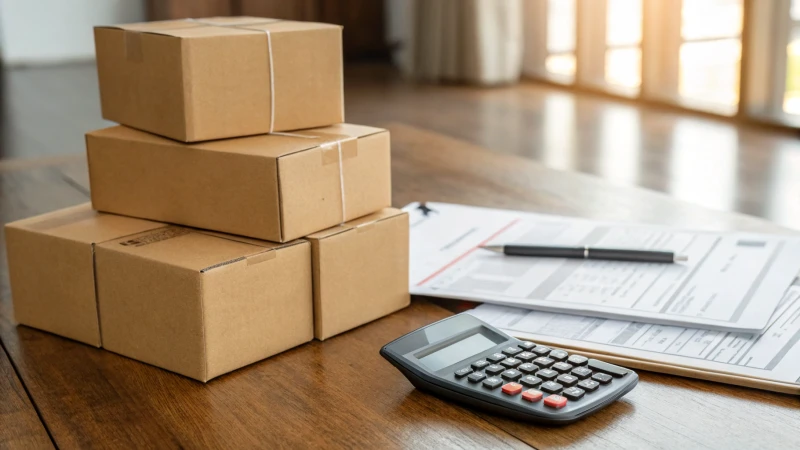Ever wondered how a small detail can make or break your international shipping? That's where 'Declared Value' comes in.
Declared Value is what you, as an importer or exporter, list on customs forms for your goods. It's crucial for determining customs duties, taxes, and fees during international shipping.
Let me take you back to the first time I had to declare a value for my shipments. I was overwhelmed, unsure if I should understate or overstate it. Each choice carried its own risks—understating could lead to penalties, while overstating might increase costs. But understanding its true impact on shipping costs and customs processes helped me navigate these waters more smoothly. It's about striking the right balance to ensure timely deliveries without unnecessary expenses. Let's explore how you can do the same.
Declared Value affects customs duties and taxes.True
Declared Value directly influences the calculation of duties and taxes.
Declared Value is optional on international shipments.False
Declared Value is mandatory to determine duties and fees.
How Does Declared Value Affect Shipping Costs?
Navigating the declared value's effect on shipping costs can feel like untangling a ball of yarn. As someone who's been in the trenches of e-commerce, I know just how pivotal this factor is in the grand scheme of shipping.
Declared value affects shipping costs by impacting insurance rates and potential liabilities. Higher declared values often lead to increased insurance premiums and can affect customs duties and taxes, thereby influencing overall shipping expenses.
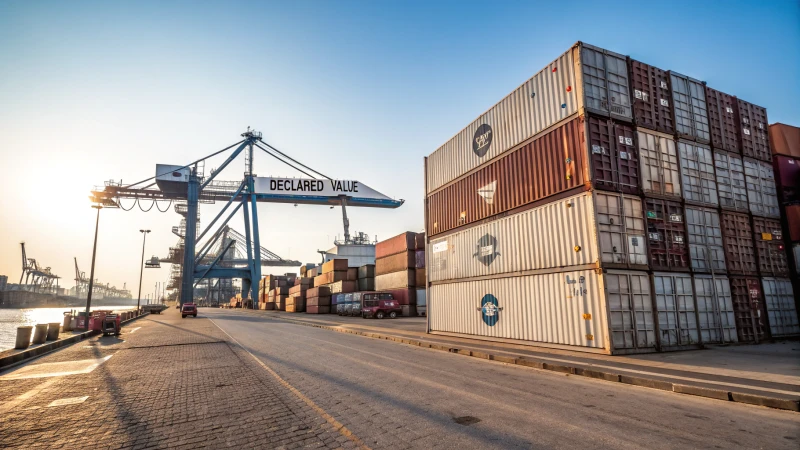
What is Declared Value?
Picture this: you're sending a precious heirloom across the globe. The declared value is essentially what you’d claim it's worth if something went awry during transit. It's like telling the shipping gods, "This is how much my item means to me, in dollars and cents." Freight forwarders and carriers use this value to calculate insurance fees and decide how much they're willing to cover if things go south.
Impact on Insurance Costs
I remember a time when I shipped a particularly valuable batch of goods. The declared value was sky-high, and so was my anxiety about the potential insurance costs. The higher the declared value, the more insurers will charge since they're assuming greater risk. Think of it this way: shipping a $5,000 bracelet isn’t just about getting it from point A to B; it’s also about ensuring it’s protected along the way.
| Declared Value | Insurance Cost |
|---|---|
| $500 | $10 |
| $5,000 | $50 |
Customs Duties and Taxes
Customs can be a tricky beast. When I first started shipping internationally, I underestimated how declared values could affect customs fees. Declaring a higher value might mean heftier duties when your package reaches its destination. It's crucial to get this right—declare too low, and you might face penalties or delays; too high, and you could pay more than necessary in taxes. Each country has its own rules for duty-free imports, which can change how duties are calculated1.
Carriers and Declared Value Policies
Every carrier has its own quirks regarding declared value. Take FedEx or USPS, for instance—they may only cover so much based on what you declare. Learning these policies is like mastering a dance; it helps you choose the right partner for your shipping needs, balancing cost with peace of mind. Make sure to dive into each carrier's liability limits2 before making your decision.
Strategic Declared Value Management
Managing declared values is like walking a tightrope; it requires balance and foresight. By assessing the risks versus potential savings in insurance and customs fees, I’ve learned to set values that serve both my wallet and my peace of mind. Tools like declared value calculators3 are invaluable for weighing different scenarios.
When deciding on declared values, I consider factors like product type, destination, and shipment volume. Each shipment becomes a puzzle where the pieces must fit just right to ensure compliance while optimizing costs in the vast world of global trade.
Higher declared value increases shipping insurance costs.True
Insurance premiums rise with higher declared values due to increased risk.
Declared value has no impact on customs duties.False
Customs duties are calculated based on the declared value of goods.
What Are the Risks of Incorrectly Declaring Value?
Ever had that gut-wrenching moment when a small error snowballed into a major crisis? Declaring the wrong value for your shipments could be just that kind of mishap.
Incorrectly declaring value can result in fines, legal action, shipment delays, and damage to a business's reputation. Accurate declaration is crucial for compliance with customs regulations.
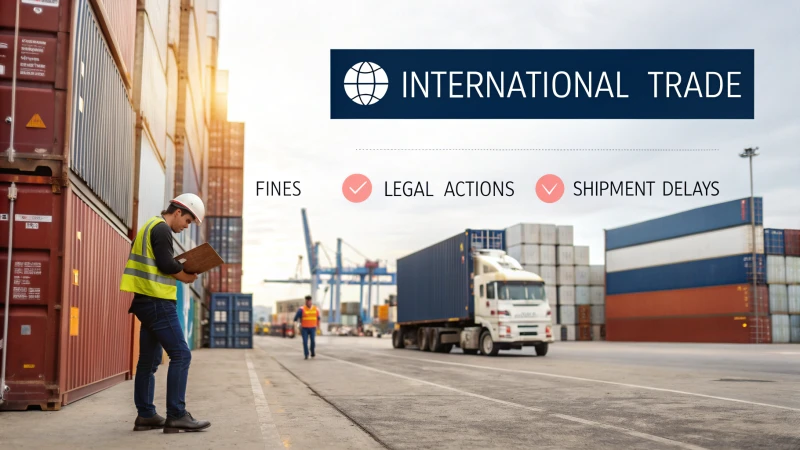
Understanding Declared Value
Declared value isn't just another box to tick on customs forms. It's the lifeline for calculating duties, taxes, and ensuring smooth customs clearance4. I learned this the hard way when I once underestimated the value of a shipment, triggering an inspection. Talk about a nerve-wracking experience!
| Risk Type | Potential Consequences |
|---|---|
| Financial | Fines and increased duties |
| Legal | Legal action, confiscation |
| Operational | Delays, damaged reputation |
Financial Implications
Picture this: you're hit with a hefty fine because you under-declared your shipment. That was me, sweating bullets when customs demanded back payments for what I thought was a minor oversight. On the flip side, over-declaring could mean paying through the nose, squeezing profit margins tighter than I'd like. Incorrect declarations can lead to hefty fines and additional charges affecting financial stability5.
Legal Ramifications
Let me tell you, being on the wrong side of a legal issue is no joke. Misdeclaring can be seen as fraud, with consequences far worse than any nightmare. Imagine having your goods confiscated or losing your import/export license—it's a path no business wants to tread. Staying ahead of regulations has become my mantra to avoid such pitfalls.
Operational Challenges
Errors in declaration can throw a wrench in the works, causing shipment delays and disrupting supply chains. I've faced disgruntled customers due to these delays, which taught me the value of maintaining accurate documentation6. It's key to keeping operations running smoothly.
By grasping these risks, I've been able to craft strategies ensuring compliance and mitigating potential issues in international trade. Regular training and audits have become second nature to me, crucial for maintaining accuracy and efficiency in the declaration process.
Declared value errors can lead to shipment delays.True
Errors prompt inspections, causing delays and disrupting supply chains.
Over-declaring value results in reduced duties.False
Over-declaring increases duties, affecting profit margins negatively.
How Does Declared Value Differ From Insurance Coverage?
Ever wondered about the fine line between declared value and insurance coverage when shipping?
Declared value sets the worth for customs duties and carrier liability limits, while insurance coverage offers protection against theft, damage, or loss during transit, regardless of the declared amount.
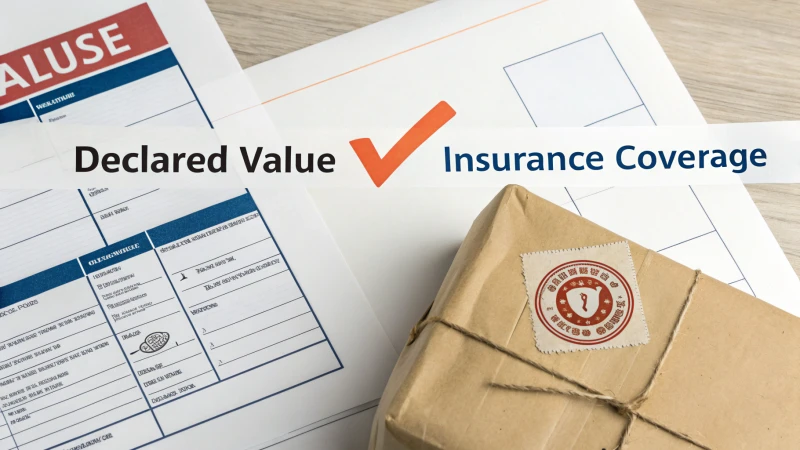
Understanding Declared Value
Imagine standing at the shipping counter, ready to send your precious fashion accessories across the globe. As you fill out the paperwork, you're asked to declare the value of your shipment. This declared value isn't just a number; it's the backbone of your shipping strategy. When I first started my e-commerce business, I learned that this value informs customs about what duties and taxes I need to pay. It also sets the cap on how much the carrier will cover if something goes wrong during transit.
For example, if I declare my shipment of unique handmade scarves at £5,000, customs uses this figure to determine any fees, and it defines the carrier's responsibility if there's an issue.
Exploring Insurance Coverage
Now, let's talk about insurance coverage—a concept that initially seemed like an unnecessary add-on to me. However, after a particularly nerve-wracking experience with a delayed shipment, I realized its true value. Insurance is like a safety net for your goods. It steps in where declared value stops, covering you against losses due to theft, accidental damage, or loss.
For instance, even though I've declared my scarves at £5,000, opting for insurance ensures I can recover their full market value if they get damaged or lost. It’s a relief knowing that I’m protected beyond just what I've declared.
Key Differences in Function and Impact
| Aspect | Declared Value | Insurance Coverage |
|---|---|---|
| Purpose | Customs fees calculation & limit carrier liability | Protects against theft, loss, or damage |
| Financial Implications | Affects duties & taxes | Adds to shipping cost but offers broader protection |
| Scope | Limited to declared amount | Covers full market value of goods |
When to Use Declared Value vs. Insurance
The decision between declared value and insurance isn't always clear-cut. During my early days in business, I grappled with this choice frequently. Declared value7 is crucial for customs—it's non-negotiable for getting your goods through borders smoothly. Insurance is more about peace of mind.
In practice, I often use declared value for my customs paperwork but rely heavily on insurance for high-value shipments that could spell disaster if lost or damaged. This approach helps me keep a balance between managing costs and safeguarding my investments.
In summary, the choice between declared value and insurance should be guided by your shipment's nature and destination. Evaluate the risks and costs associated with each option to make decisions that align with your business goals. Whether you're like me shipping delicate accessories8 or something entirely different, understanding these concepts can save you from potential headaches down the road.
Declared value affects customs duties and taxes.True
Declared value is used to calculate customs duties and taxes.
Insurance coverage limits carrier liability during transit.False
Insurance coverage protects against loss, not limit liability.
What Best Practices Should You Follow When Declaring Value?
Navigating customs regulations can be a real headache, but getting the declared value right is a game-changer. Let's delve into the best practices that can save you from potential pitfalls.
To declare value effectively, keep detailed records, grasp customs rules, apply fair market values, and consult experts. These strategies prevent delays and ensure smooth international shipping.
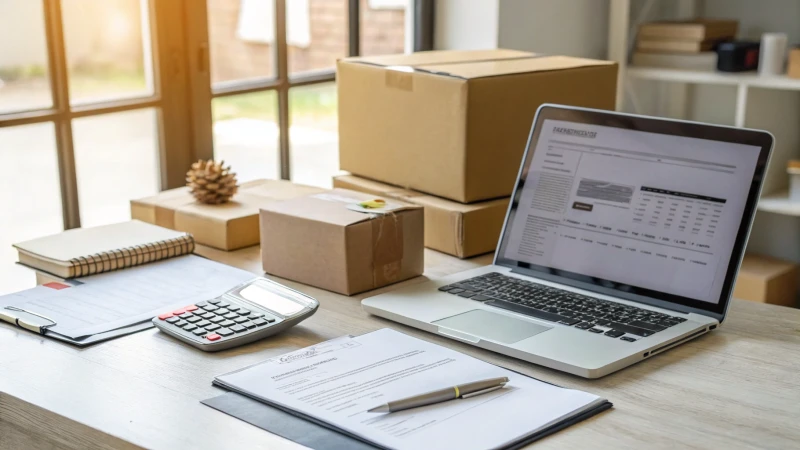
Understanding Declared Value
Declared value in international shipping isn't just a number; it's your passport to smoother customs clearance and potentially lower costs. It's the declared cost of goods on customs forms, impacting duties and taxes. I remember when I first started shipping products globally—figuring out declared value felt like solving a puzzle. But once you get it right, it can save time and money.
Accurate Documentation
Let me tell you, keeping precise records is like having a superpower in the world of international trade. Whether it's invoices, purchase orders, or shipping documents, every piece of paper (or digital file) matters. I once underestimated the importance of this and faced a lengthy delay that almost derailed my delivery timeline. Now, I rely on digital tools to keep everything tidy and error-free.
| Document Type | Importance |
|---|---|
| Invoice | Confirms sales transactions |
| Purchase Order | Validates buyer's intent |
| Shipping Label | Ensures correct delivery details |
Realistic Valuations
Setting a realistic value for your goods isn't just about avoiding audits; it's about being fair to yourself and your business. Using market value as a guide helps you stay compliant and avoid unnecessary costs. I learned this the hard way after overvaluing a shipment, only to end up with hefty duties that ate into my profits.
Navigating Customs Regulations
Every country has its own set of customs rules that can feel overwhelming. But trust me, understanding these regulations can prevent a lot of headaches. Partnering with freight experts is like having a GPS for this complex terrain—they can guide you through documentation and compliance effortlessly.
Seeking Expert Advice
I can't emphasize enough the value of working with experienced freight experts or customs brokers. Their insights into complex regulations9 have been invaluable in helping me avoid costly mistakes.
Leveraging Technology
Embracing logistics software was a game-changer for me. It automates value declaration, minimizes human errors, and speeds up processing times. Plus, it keeps me updated on any regulatory changes, so I never miss a beat.
By embracing these best practices, I've not only streamlined my shipping process but also ensured compliance with ease. It's all about aligning your operations with both business goals and legal standards. If you're keen to further optimize your operations, consider exploring more about logistics solutions10. It might just be the push you need to elevate your shipping game.
Accurate documentation prevents customs delays.True
Maintaining precise records helps avoid fines and shipping issues.
Overvaluing goods decreases customs duties.False
Overvaluation leads to higher duties, not lower, due to inflated costs.
Conclusion
Declared Value is crucial for international shipping, impacting customs duties, taxes, and insurance costs. Accurate declaration ensures compliance and prevents financial penalties during cross-border trade.
-
Understanding duty calculations helps prevent unexpected fees during customs clearance. ↩
-
Knowing carrier liability limits aids in choosing the right service for your needs. ↩
-
Using calculators helps make informed decisions on setting declared values. ↩
-
Explore how declared value impacts the customs clearance process to ensure smooth shipping and avoid delays. ↩
-
Understand how incorrect value declarations can destabilize your finances by leading to unexpected fines or costs. ↩
-
Discover why maintaining accurate customs documentation is critical for avoiding shipment delays and penalties. ↩
-
Understanding declared value is crucial for managing customs duties and limiting carrier liability. ↩
-
Learn strategic insights on when to use declared value versus insurance for optimal shipping protection. ↩
-
Learn about the various customs regulations regarding declared value to avoid penalties and ensure smooth processing. ↩
-
Discover software solutions that automate logistics processes, enhancing efficiency and accuracy in international shipping. ↩

